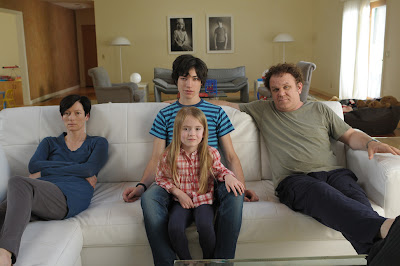If it seems to you as though WE NEED TO TALK ABOUT KEVIN only recently opened theatrically and was reviewed by most critics, you're right: That was its one-week, end-of-year, "Oscar" qualifying run. Starting this week Lynne Ramsay's movie is back in theaters for a longer stint, which should give audiences a better chance to see this unusually artful and riveting updating of The Bad Seed.
Consisting of one bravura scene after another, the movie is one of those fractured films, the splinters of which are each so well thought-out and crafted that you easily follow what's happening, placing together these splintered scenes to guide you toward... the inevitable. That "inevitable" is both the crowning achievement of Ms Ramsay's movie (the director is shown at right) and its biggest problem. Is that it? you'll be asking as the final credits roll. And, yes, folk, that is indeed it. There's a hole at the heart of We Need to Talk About Kevin that must remain there because there is simply no single "big" answer to the question that haunts the film, How could this happen? Oh, we get a bunch of smaller answers which, taken together as they must be, offer salient clues aplenty.
This story of a student who goes on a killing rampage is by now old hat -- periodically in the news and in movies made from that news (among them: Elephant, Dark Matter, Beautiful Boy, and now this one). Fortunately, each of these films has its own style plus a nice variation in surrounding content. Ramsay's use of the splintering effect to create tension between past and present, adult and child, and action/response places this film near the top of the heap.
There's a scene early in which a woman approaches our heroine, Eva (another superb performance from Tilda Swinton, above) and suddenly slaps/slugs her. It's a visceral moment, utterly shocking and provocative. While it seems to come from nowhere, we already know enough from the splinters we've seen to understand it deeply -- from both the perspective of the woman who throws the punch and her recipient
Likewise a scene in which Swinton pushes a baby carriage into a zone occupied by a crew of men using jackhammers. Again, utterly odd but fully understandable, given what we already know of Swinton's character, and of her new baby.
The movie is full of these scenes and moments. By film's end, a mosaic has come into shape that fills in a lot of blank spaces around an even larger blank in the center of it all. It's clear Eva should never have become a mother; it's clear that her weaker husband, Franklin (John C. Reilly, as good as ever), is little help; it's clear that there is something horribly wrong with their child Kevin -- played as a toddler by Rock Duer, elementary-school age by Jasper Newell, and as a teenager by the uber-talented Ezra Miller (shown above, from AfterSchool, City Island, Every Day, Another Happy Day). What's unclear is that something could have legitimately been done to correct any of this -- short of enormous (probably impossible, certainly unbelieveable) character change, or abortion, or maybe mercy killing.
The standoff ending makes it clear that there will be no peace here, no cure. The cards are on the table, and finally, at least, everyone knows where s/he stands. What we have here is much more powerful and unsettling than anything that some sort of cheap "closure" might provide.
Nothing in Ms Ramsay's earlier career (the dawdling and disappointing Ratcatcher and Morvern Callar) appeared to pave the way for a breakthrough like this one. Perhaps it was the topic itself that vitalized the woman's filmmaking skills. Whatever, the filmmaker has done an exceptional job, and so have her actors, making the movie one of this new year's must-sees.
From Oscilloscope Laboratories, We Need to Talk About Kevin opens this Friday, January 13, in New York City at the Lincoln Plaza Cinemas and the Angelika Film Center. The following week will see it play the Los Angeles area, and in the weeks and months to come, it'll be all over the country. Click here for a listing of cities, dates and theaters.
Subscribe to:
Post Comments (Atom)










No comments:
Post a Comment